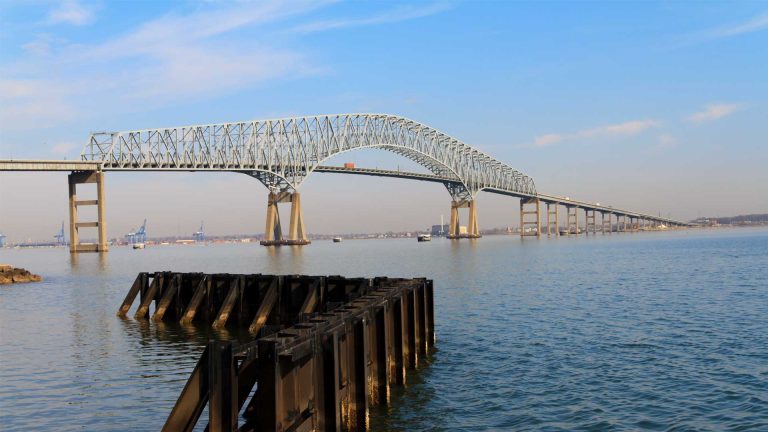
Date:
Maersk vessel collapses Baltimore bridge
The Dali, a time chartered Maersk container vessel with two pilots onboard, crashed into a support pylon of the Francis Scott Key Bridge in Baltimore, Maryland, in the early hours of Tuesday 26th February, collapsing a large section of the 1.6 mile bridge into the Patapsco River.
The Francis Scott Key bridge was the main thoroughfare for drivers between New York and Washington who sought to avoid downtown Baltimore. It was one of three ways to cross the Baltimore Harbour, with a traffic volume of 31,000 cars per day or 11.3 million vehicles a year.
The collapse of the bridge has cut off access in and out of the port for vessels. Around the world, about 40 ships, including 34 cargo vessels, have Baltimore listed as a destination, including 10 commercial ships with anchors dropped in nearby waters, according to MarineTraffic.
Baltimore port’s private and public terminals handled 847,158 autos and light trucks in 2023, the most of any U.S. port.
On top of the RORO operations Baltimore port handles around 21,000 TEU a week, which will have to be re-routed via other ports in the region until access is restored.
It is still unknown how long the port will be cut off due to the incident, but any length of downtime will greatly impact RORO capacity into the US East Coast, as well as cause additional congestion at alternative ports that will need to take on the overflow of ocean containers that would naturally route through Baltimore.
This also comes at a time when there is an element of uncertainty regarding the future situation at the US East and Gulf Coast ports due to the International Longshoremen’s Association and the United States Maritime Alliance current contract set to expire on 31st September 2024. Whether this incident will have any impact on the negotiations remains to be seen but Metro will be monitoring the situation closely and will be keeping our customers informed.
Automotive logistics contingency
The impact on RoRo, container and conventional freight moving into Baltimore is going to be significant. Baltimore is one of the largest RoRo ports for global vehicle movements into and out of the US East Coast. Carriers have already began to advise of diversions and avoidance of the port for the foreseeable future across all ocean freight modes.
We anticipate that there will be a consequential effect on vessel rotations and schedules ongoing to and from Europe and that vehicle compounds at alternative ports will become congested adding further to the impact, especially on the automotive sector.
RoRo carriers are already seeing a surge in bookings, adding further pressure on the high demand routes to the US. We will continue to update on the situation and market intelligence as it unravels. The impact will be ongoing for many weeks, and as experienced from the pandemic and Red Sea situations it is likely that indirect issues will arise as an outcome of the initial tragedy.
Metro have alternative solutions to Baltimore gateway and we can provide containerised services for vehicles and also other gateways into the US.
We are currently compiling the alternative options that we have and can share these with you in conjunction with our partner shipping lines and local offices in the US.
Please contact us for further information and speak with your account manager who will be delighted to arrange a meeting or Teams call to discuss the options available and your own specific needs and forecasts during the period of closure.
If you would like any further information on this solution and how it can work for you please do not hesitate to EMAIL our Automotive Account Director, Ian Tubbs.
SEE ALSO THIS BBC ARTICLE: Fears of disruption to global supply chains after Baltimore bridge crash
